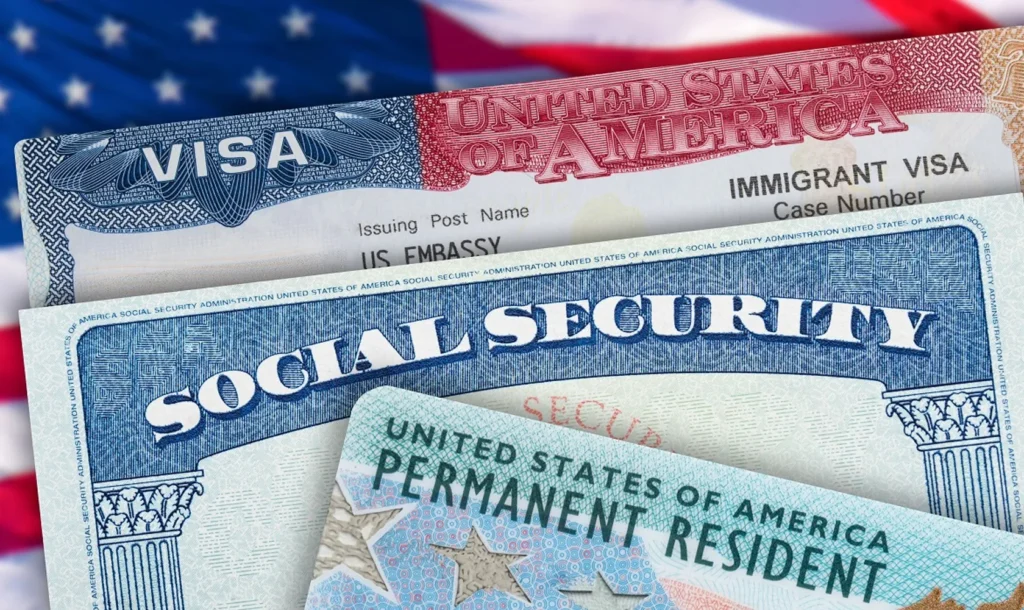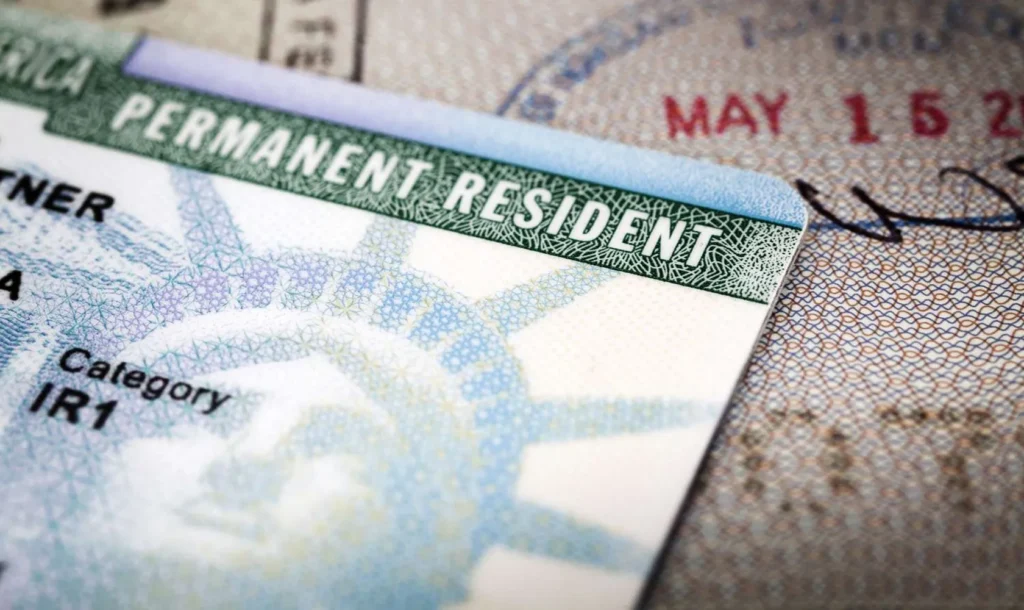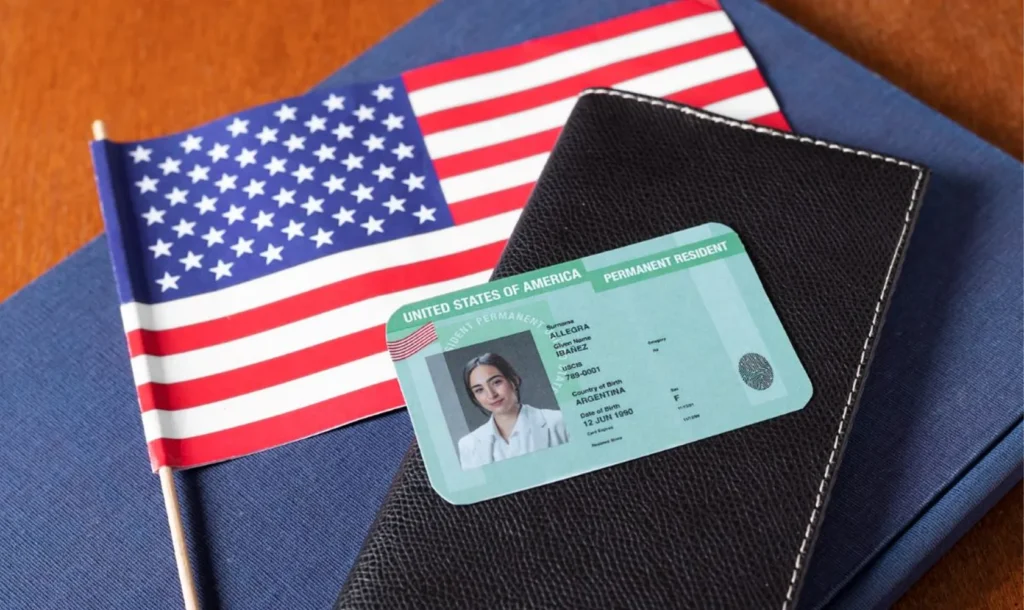What is US Green Card: A Gateway to Opportunity in the United States
The United States of America, a land of opportunity and innovation, beckons to millions around the world. For those seeking to establish themselves in this dynamic nation, the Green Card, officially known as a Permanent Resident Card, serves as a coveted key. This document unlocks a treasure trove of benefits, granting lawful permanent residency and paving the way for a fulfilling life in the US.
The Green Card serves as a powerful symbol of opportunity in the United States. It empowers individuals to build a life, contribute to the nation’s fabric, and pursue the American dream. While the application process can be complex, the long-term benefits outweigh the initial hurdles. With careful planning, professional guidance, and a commitment to fulfilling the associated responsibilities, the Green Card can pave the way for a fulfilling and prosperous life in the United States.

Demystifying the Green Card: Understanding its Significance
A Green Card grants the holder the legal right to live and work permanently in the United States. It’s a crucial stepping stone for those who aspire to build a life in this country, offering significant advantages over temporary visas. Here’s a glimpse into the key benefits of holding a Green Card:
- Work Authorization: Green Card holders are free to work for any employer in the US without requiring a separate work permit. This flexibility empowers them to pursue their chosen careers and contribute to the nation’s workforce.
- Travel Freedom: Green Cards come with the privilege of re-entering the US after traveling abroad. Unlike temporary visas with specific validity periods and limitations, Green Cards allow for greater travel flexibility.
- Education Opportunities: Green Card holders and their dependent children qualify for in-state tuition rates at public universities, offering significant cost savings compared to out-of-state or international student fees.
- Path to Citizenship: After holding a Green Card for a specific period (typically five years with some exceptions), individuals can apply for U.S. citizenship, gaining the full rights and privileges associated with it.
- Sponsorship Benefits: Green Card holders can sponsor eligible immediate family members, such as spouses and unmarried children under 21, for permanent residency in the US.
- Social Security Benefits: Green Card holders are eligible to participate in the Social Security system, contributing to their retirement and potentially qualifying for Social Security benefits in the future.
In essence, the Green Card is a bridge to a life of opportunity in the United States. It empowers individuals to build careers, access quality education, reunite families, and ultimately, pave the way for U.S. citizenship.

Charting Your Course: The Diverse Paths to a Green Card
The US immigration system offers various pathways to obtaining a Green Card. Here’s a breakdown of some of the most common categories:
- Family Sponsorship: U.S. citizens can sponsor their spouses, unmarried children under 21, and parents for permanent residency. Legal permanent residents (Green Card holders) can also sponsor their spouses and unmarried children under 21, but the waiting times can be longer.
- Employment-Based Immigration: Highly skilled professionals with in-demand qualifications can secure employer sponsorship for a Green Card. This category caters to individuals who can significantly contribute to the US workforce in specific fields like science, technology, engineering, and healthcare.
- Investment: The EB-5 program allows foreign nationals who invest a significant amount of capital (currently USD 800,000 or USD 1,050,000 depending on the investment location) in a US commercial enterprise to apply for a Green Card.
- Diversity Visa Lottery: The US Diversity Visa Lottery program offers a chance for individuals from countries with historically low immigration rates to the US to obtain a Green Card. Selection is random, making it a competitive process.
- Marriage to a Green Card Holder: Foreign nationals who are married to a Green Card holder can apply for a Green Card themselves. However, waiting times can vary depending on the Green Card holder’s spouse’s citizenship category.
- Refugee/Asylum: Individuals fleeing persecution in their home countries can apply for refugee or asylum status, which may eventually lead to a Green Card.
It’s important to note that this is not an exhaustive list, and eligibility requirements can vary depending on the chosen category. Consulting with an experienced immigration attorney is recommended to determine the most suitable path based on your individual circumstances.

The Application Process: Navigating the Path to Permanent Residency
Obtaining a Green Card can be a complex process with varying timelines depending on the chosen category. Here’s a simplified overview of the general steps involved:
- Petition Filing: Depending on the category, a petition needs to be filed with the USCIS (U.S. Citizenship and Immigration Services) by either a sponsoring family member, employer, or yourself (for certain categories like the EB-5 program).
- Priority Date: Upon petition approval, a priority date is established, which determines your place in line for visa processing. Wait times can vary significantly depending on the category and your country of origin.
- Application and Interview: Once the priority date becomes current, you will receive instructions to file Form I-485, Application to Register Permanent Residence or Adjust Status. This form, along with supporting documents, is submitted to the USCIS. An interview will likely be scheduled to assess your eligibility and verify information.
- Medical Examination: All Green Card applicants must undergo a medical examination by a USCIS-designated physician to ensure they meet specific health requirements.
- Background Checks: The USCIS conducts thorough background checks to ensure public safety and national security.
- Green Card Issuance: Upon successful completion of all stages, the USCIS will mail your Green Card, officially granting you permanent resident status.
The Green Card application process can be intricate and time-consuming. Seeking guidance from an immigration attorney familiar with the specific requirements of your chosen category is highly recommended. They can assist with navigating the complexities, ensuring proper documentation, and maximizing your chances of a successful outcome.

Life as a Green Card Holder: Embracing Opportunities and Fulfilling Dreams
Obtaining a Green Card signifies more than just legal status; it unlocks a world of possibilities in the United States. Here’s a glimpse into what life as a Green Card holder might entail:
- Career Advancement: Green Card holders can freely pursue their chosen careers without limitations on employers or job changes. They can leverage their skills and experience to contribute to the US workforce and climb the professional ladder.
- Business Ownership: Green Cards empower individuals to establish and operate their own businesses in the US, fostering entrepreneurial spirit and economic contribution.
- Financial Security: With the ability to work and invest freely, Green Card holders can strive for financial stability and build a secure future in the US.
- Education and Training: Green Card holders have access to a vast array of educational and training opportunities, allowing them to enhance their skills and qualifications for career advancement.
- Community Building: Green Cards open doors to integrate into American society, participate in local communities, and forge meaningful connections.
Overall, the Green Card is a stepping stone to a fulfilling life in the United States. It empowers individuals to pursue their dreams, contribute to the nation’s growth, and build a lasting legacy.

Important Considerations: Responsibilities and Limitations of Green Cards
While the Green Card offers a multitude of benefits, it’s essential to understand the associated responsibilities and limitations:
- Taxes: Green Card holders are required to pay US federal, state, and local taxes on their worldwide income, similar to US citizens.
- Travel Requirements: Green Cards are not lifetime travel documents. Extended absences from the US without proper documentation can jeopardize permanent resident status.
- Selective Service Registration: All male Green Card holders between the ages of 18 and 25 are required to register with the Selective Service System.
- Maintaining Status: Green Card holders must comply with specific requirements to maintain their status, such as filing renewal applications at designated intervals.
Understanding these responsibilities and limitations is crucial for Green Card holders to ensure they remain in good standing with US immigration authorities.


